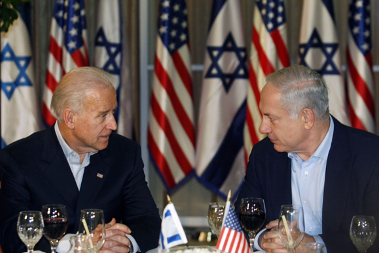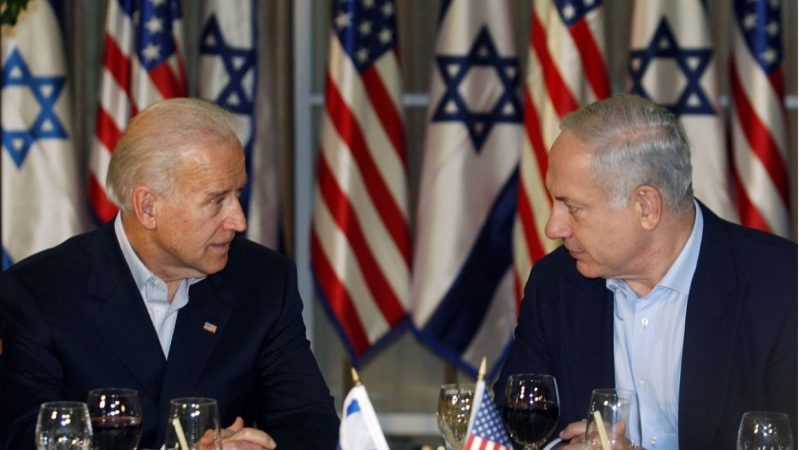“Palestinian question is not a religious but political issue. European imperialists wisely placed Israel where she could geographically divide the Arab world”.
Malcolm X
The colonization of Palestine is a complex and contentious historical and political issue. It refers to the establishment of Jewish settlements in the region that is now Israel and the Palestinian territories. This process began in the late 19th century and continued into the 20th century, with significant waves of Jewish immigration and land acquisition. The Zionist movement, which sought to establish a Jewish homeland in Palestine, played a central role in this colonization. The British Mandate for Palestine, which lasted from 1920 to 1948, also contributed to the establishment of Jewish settlements. The United Nations’ 1947 partition plan led to the creation of the State of Israel, which further intensified the conflict between Jewish settlers and Palestinian Arab residents.[i]

Two Zionist leaders: Joe Biden and Benjamin Netanyahu
American support for Israel has been a consistent and significant aspect of U.S. foreign policy for many decades. This support is rooted in a combination of historical, political, strategic, and moral factors. The historical connection between the United States and Israel dates back to the foundation of the modern State of Israel in 1948. President Harry S. Truman was the first world leader to officially recognize the newly established state. Both countries share democratic and liberal values, making them natural allies. Israel is the only democracy in the Middle East, and the U.S. values its commitment to democratic principles and the rule of law. The horrors of the Holocaust during World War II deeply affected American leaders and the public. Many saw the establishment of Israel as a moral obligation to provide a homeland for Jewish survivors. Israel is considered a stable and reliable ally in a volatile region. The U.S. sees Israel as a partner in promoting regional stability and countering common threats, such as terrorism and the influence of hostile states. The U.S. and Israel have developed extensive military and intelligence cooperation, including joint military exercises and the sharing of vital security information. This collaboration strengthens both countries’ security. Pro-Israel lobbying groups, such as the American Israel Public Affairs Committee (AIPAC), have a significant presence in the U.S. and influence policymakers to maintain strong U.S.-Israel relations.[ii]
The United States has provided substantial financial and military aid to Israel over the years. This support has helped Israel maintain its security and economic stability. The U.S. and Israel often share common interests in the Middle East, including promoting peace, countering regional threats, and supporting stability in the region. U.S. politicians from both major political parties have consistently expressed support for Israel. This bipartisan backing has helped maintain strong relations. The United States has played a key role in peace negotiations in the Middle East. While there have been ups and downs in the peace process, the U.S. continues to engage diplomatically to find a resolution to the Israeli-Palestinian conflict.[iii]
What Israel is doing in the region?
The term “Israeli massacre in Palestine” refers to events in which there have been large-scale loss of life among Palestinians in the Israeli-Palestinian conflict. It’s important to recognize that this is a highly sensitive and controversial topic, and interpretations of events can vary widely depending on one’s perspective. The Israeli-Palestinian conflict has a long history of violence, with multiple incidents of bloodshed over the years. Some notable examples include the Sabra and Shatila massacre in 1982 and various military operations in Gaza. Many incidents in the Israeli-Palestinian conflict have involved civilian casualties, including women and children. The loss of innocent lives is a tragedy regardless of the circumstances. The question of whether particular incidents constitute “massacres” may be a matter of debate. International humanitarian law places obligations on parties involved in conflicts to protect civilians and avoid excessive harm. Violations of these laws are subject to international scrutiny and condemnation.[iv]
Incidents in which significant loss of life occurs often receive extensive media coverage, drawing international attention and reactions. These events typically prompt responses from governments, international organizations, and civil society. Some call for investigations, condemn the violence, or advocate for peace and conflict resolution. The Israeli-Palestinian conflict is highly complex, with multiple narratives and perspectives. What one side sees as a military operation in self-defence, the other side may perceive as an attack on civilians. The cycle of violence in the Israeli-Palestinian conflict underscores the importance of diplomatic efforts and negotiations to find a peaceful resolution to the conflict. Various peace plans and negotiations have been attempted over the years, with varying degrees of success.[v]
Western Response to Israeli Massacre
The Western response to events in the Israeli-Palestinian conflict, including what some might describe as massacres or significant escalations of violence, has been multifaceted and evolved over time. The response from Western nations, particularly Western governments and international organizations, has often involved a mixture of diplomatic efforts, statements, aid, and resolutions.[vi]
Western governments, including the United States and European countries, have been actively involved in diplomatic efforts to mediate and resolve the Israeli-Palestinian conflict. This involvement has taken various forms, from brokering peace talks to pushing for ceasefires during escalations in violence. Western leaders and governments often issue statements condemning violence or loss of civilian life in the region. They may call for de-escalation and respect for international humanitarian law. The tone and content of these statements can vary, but they generally express concern for the situation. Western countries, through international organisation and non-governmental organisations (NGOs), provide humanitarian assistance to Palestinians affected by violence and conflict. This aid includes food, medical supplies, and support for rebuilding infrastructure. Western nations play a role in the United Nations, and there have been numerous UN resolutions related to the Israeli-Palestinian conflict. These resolutions often reflect the broader international consensus and call for actions such as a two-state solution or condemn violence.[vii]
Western countries, particularly the United States, have provided military aid and equipment to Israel. This aspect of the response has drawn criticism from some quarters, as there are concerns that such support can contribute to the conflict’s perpetuation. Western public opinion often influences government policies. Protests, demonstrations, and advocacy by civil society organizations play a role in shaping the Western response to events in the Israeli-Palestinian conflict. Public opinion can vary widely, with some advocating for stronger support for Israel and others calling for more significant pressure on Israel to address Palestinian rights.
In some cases, Western governments have considered or imposed economic sanctions or measures in response to actions taken in the region. These measures aim to influence the behaviour of parties involved in the conflict. The perception of double standards in the treatment of the Palestinian issue is a common concern raised by various parties in the Israeli-Palestinian conflict. It often refers to the notion that different standards or principles are applied to the Israeli-Palestinian conflict compared to similar conflicts or international issues. Critics argue that international law, particularly in the context of United Nations resolutions, is not consistently applied. They point to UN resolutions calling for a two-state solution and the end of Israeli settlements in the occupied territories, arguing that these have not been effectively enforced. Some argue that the international community’s response to the Israeli-Palestinian conflict is different from its response to other conflicts with similar dynamics. This discrepancy in treatment may be viewed as favouring one side over the other. Concerns are raised about the application of human rights and humanitarian law. Critics argue that Israeli actions, such as the blockade of Gaza or military operations, are not held to the same standards as similar actions in other conflicts.[viii]
The lack of progress in achieving a two-state solution is often attributed to perceived double standards. Critics argue that the international community has not exerted sufficient pressure on both parties to reach a negotiated settlement, which can be seen as favouring the status quo. How the Israeli-Palestinian conflict is portrayed in the media and perceived by the public can contribute to the perception of double standards. Different narratives and levels of empathy may be noted in coverage of similar conflicts. The geopolitical interests and alliances of various countries can influence their positions on the Israeli-Palestinian issue, sometimes leading to perceived inconsistency in their stance on human rights and self-determination. Pro-Israel and pro-Palestinian lobbying groups play a role in shaping the stance of Western governments and international organizations, leading to concerns about bias.[ix]
A Crime Against Humanity in the Middle East
The United States and Israel have a deep and multifaceted relationship that encompasses political, military, economic, cultural, and historical ties. The U.S.-Israel relationship has deep historical roots, dating back to the establishment of the State of Israel in 1948. The U.S. was among the first countries to officially recognise Israel’s sovereignty. The United States views Israel as a strategic partner in the Middle East. This partnership includes cooperation on issues related to regional stability, counterterrorism, and intelligence sharing. The U.S. provides significant military assistance to Israel, making it one of the largest recipients of U.S. foreign aid. This support includes the sale of advanced military equipment and cooperation in missile defence systems. The U.S. and Israel have strong economic relations, including trade, investment, and collaboration in various industries such as technology, pharmaceuticals, and cybersecurity.[x]
Both countries promote cultural and academic exchange programs, facilitating the exchange of ideas, innovation, and education. The United States has played a key role in peace efforts in the Middle East, including negotiations between Israel and its neighbors. The U.S. has often been a mediator in the Israeli-Palestinian conflict. The United States consistently supports Israel at the United Nations and has used its veto power in the UN Security Council to shield Israel from resolutions that it perceives as biased. Pro-Israel lobbying groups, such as the American Israel Public Affairs Committee (AIPAC), have a significant presence in Washington, D.C., and influence U.S. policies toward Israel. American public opinion about Israel varies, but generally reflects strong support for Israel’s right to exist and concerns about Israel’s security. Public opinion can influence political decision-making. The U.S.-Israel relationship is not without controversy. There are ongoing debates over issues such as Israeli settlements, Palestinian rights, and the peace process. These challenges occasionally strain the relationship.[xi] The Israeli-Palestinian conflict has been a subject of significant debate and controversy for decades, and the level of U.S. support for Israel has been a central issue. U.S. support for Israel has been multifaceted, including financial aid, military assistance, and diplomatic backing. This support has been based on a variety of factors, including shared strategic interests, historical ties, and domestic political considerations.
Conclusion
The colonization of Palestine remains a deeply divisive and unresolved issue. It is essential to approach this topic with sensitivity and recognize the ongoing conflicts and negotiations surrounding the Israeli-Palestinian conflict. The situation may have evolved since my last knowledge update in September 2021, so I recommend consulting more recent sources for the latest developments.
It’s important to note that the U.S.-Israel relationship is both bipartisan and multifaceted, involving a range of political, military, economic, and cultural aspects. While the relationship is generally strong and cooperative, it can also be a subject of debate and discussion, reflecting the complexities of the Middle East and the Israeli-Palestinian conflict. On the other side, the Western response to events in the Israeli-Palestinian conflict is a complex and politically charged issue, with differing views on the appropriate course of action. The approach of individual Western nations may also vary. Some countries, such as the United States, have been staunch supporters of Israel, while others have taken a more balanced approach or emphasized Palestinian rights. The Western response can shift in response to events on the ground, changes in leadership, and evolving international dynamics. It’s important to approach discussions about such incidents with empathy and an understanding of the broader historical and political context. The Israeli-Palestinian conflict is one of the most challenging and deeply rooted conflicts in the world, and addressing it requires thoughtful consideration of the issues and a commitment to a just and lasting resolution. It’s essential to note that American support for Israel has been a topic of debate and criticism, particularly in the context of the Israeli-Palestinian conflict. Some argue that unwavering U.S. support for Israel can hinder peace efforts and has implications for regional stability. Nevertheless, the U.S.-Israel relationship remains a critical component of American foreign policy in the Middle East. It’s important to acknowledge that the perception of double standards can vary significantly depending on one’s perspective and that the Israeli-Palestinian conflict is a complex, deeply rooted issue with a multitude of historical, political, and cultural factors at play. The debate over double standards underscores the need for a consistent and impartial application of international law and principles, as well as a more unified and determined international effort to facilitate a just and lasting resolution to the conflict. Critics argue that U.S. support for Israel has sometimes contributed to the perpetuation of the Israeli-Palestinian conflict and the suffering of Palestinian populations. They cite concerns about Israel’s treatment of Palestinians in the occupied territories, settlement construction, and military actions.
On the other hand, supporters of the U.S.-Israel relationship argue that it is rooted in shared values and strategic interests, and they highlight Israel’s position as democratic in a volatile region. It’s important to note that U.S. policies and public opinion on this matter can vary, and there are diverse perspectives on the issue both within the United States and internationally. The topic is highly sensitive and politically charged, and opinions differ widely. For the most up-to-date and comprehensive understanding of the issue, it’s essential to consult a variety of sources and viewpoints.
Notes
[i] Eppel M. (2019). The Palestine conflict in the history of modern Iraq: the dynamics of involvement 1928-1948 (First). Routledge.
[ii] Chávez Karma R. (2019). Palestine on the air: a supplement to journal of civil and human rights. University of Illinois Press.
[iii] Maira S. (2018). Boycott!: the academy and justice for Palestine. University of California Press.
[iv] Masalha N. (2018). Palestine: a four thousand year history. Zed.
[v] Bashir B. & Farsakh L. (2020). The Arab and Jewish questions: geographies of engagement in Palestine and beyond. Columbia University Press.
[vi] Dowty A. (2019). Arabs and jews in ottoman Palestine: two worlds collide. Indiana University Press.
[vii] Wagman R. (2018). Palestine a Jewish question. Cambridge Scholars Publishing.
[viii] Nelson C. & Gizzi M. C. (2021). Peace and faith: Christian churches and the Israeli Palestinian conflict. Presbyterians for Middle East Peace
[ix] Farsakh L. (2021). Rethinking statehood in Palestine: self-determination and decolonization beyond partition. University of California Press.
[x] Halper J. (2021). Decolonizing Israel liberating Palestine: Zionism settler colonialism and the case for one democratic state. Pluto Press.
[xi] Hazkani S. (2021). Dear Palestine: a social history of the 1948 war. Stanford University Press.









Leave a Reply